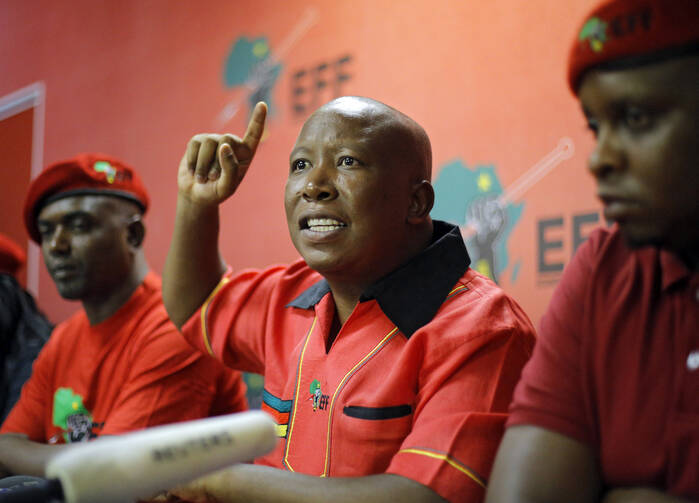“We have seen the evil consequences of civil war in other African countries‚ including massive loss of lives‚ a refugee crisis and irreparable damage to the economy. We do not want our nation to take such a path,” the chair of the Justice and Peace Department of the Southern African Bishops’ Conference, Bishop Abel Gabuza, said on April 25. The bishop was responding to an interview given by firebrand opposition party leader, Julius Malema, to Al-Jazeera during which he threatened violence.
Malema is the leader of the Economic Freedom Fighters (E.F.F.). The party was formed by Malema—and a few others—after they were expelled by the African National Congress (A.N.C.) from its youth league.
“We are deeply saddened to hear of war rhetoric by the leader of the Economic Freedom Fighters,” Bishop Gabuza said.
Malema told Al-Jazeera host, Jonah Hull, that the E.F.F. would “run out of patience very soon and we will remove the government through the barrel of a gun.” On April 25 the governing A.N.C. laid charges of treason against Malema, charging that his comments were treasonous and constituted a violation of the Electoral Commission of South Africa’s (I.E.C) charter.
The E.F.F. remains defiant and dismissed the A.N.C’s. action as irrational and childish. Meanwhile the secretary general of the A.N.C’s. youth league, Njabulo Nzuza, told the media that the league “pledges that it will never allow hooligans and war lords to bring this country into violence.”
Bishop Gabuza said that war rhetoric from South African politicians could incite election violence and civil war and therefore they should refrain from such rhetoric and actions. The bishop went on to say that the Justice and Peace Department is concerned about the “rising incidence of violent protests as the country approaches local government elections.” South Africans are due to go to the polls August 3 to vote in municipal elections.
Meanwhile a senior member of the E.F.F. responded to the government’s charge against Malema. Secretary General Godrich Gardee said that Malema’s comments need to be read in the context of an election: “It’s a fair political comment in an election-mood period...it should be seen in that context.” He said that the E.F.F would will never “dare to take up the barrel of a gun and fight this A.N.C. government.”
Malema was asked in the interview if he meant it literally, he responded, “I mean it literally. We are not scared. We are not going to have a government that disrespects us.”
Gardee later contradicted himself when he questioned why arms should not be taken up against the A.N.C. “When the apartheid government was killing our people, prior to 1994, how did the A.N.C. respond? It took up arms. So why should arms not be taken up against it when it is busy killing our people like it massacred our people in Marikana?”
Gardee was referring to the shooting of 32 striking platinum miners by the South African Police in 2012. The “Marikana Massacre,” as it has been named, is the single most lethal use of force by the police against civilians in South Africa since the 1960 Sharpville Massacre during the apartheid era. A commission of inquiry was established to look into the massacre.
The commission failed to hold any senior people accountable for the event. President Jacob Zuma later suspended the national police commissioner, Riah Phiega, who was in command of the police at the time. Many South Africans believed that Phiega was the scapegoat. She took the fall for other senior politicians who were involved in the tragedy.
Gardee also said that the E.F.F. would stop the government when it killed people who were protesting for water, electricity and higher wages. Protests have become increasingly common and violent in recent months as anger mounts in poorer communities over problems such as the lack of running water and tarred roads and poor basic services like the removal of trash. Riot police with tear gas and stun grenades have often been deployed.
Bishop Gabuza also warned the government against the use of force. He said that the Justice and Peace Commission believed that the use of “excessive force as a deterrent will not in itself solve the complex problem of violent protests.” He went on to say that if the government wants to stop protests it should make serious efforts to tackle the root causes. The bishop listed these as “rising economic inequalities, youth unemployment, a culture of patronage and the fierce scramble for political positions—especially when such positions are considered as an opportunity for self-enrichment.”
Russell Pollitt, S.J., is director of the Jesuit Institute South Africa and a Johannesburg correspondent for America.








